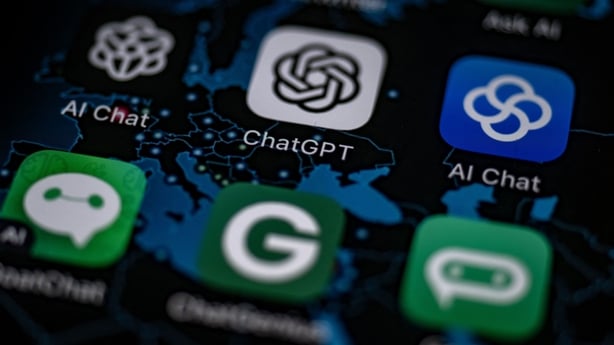Facing facts in the realm of science fiction

The 2002 movie Minority Report portrays a dystopian world where officers from the ‘precrime’ police department arrest criminals before they have committed an offence based on foreknowledge of crimes they will carry out in the future.
It is a science fiction film but the real-world concept of using artificial intelligence for ‘predictive policing’ is banned under the EU’s new AI Act which was approved by the European Parliament on Wednesday.
“There are some aspects of the legislation, that are as if you’re regulating science fiction,” said Barry Scannell, AI law specialist with William Fry.
“AI systems which are used to determine the likelihood of whether or not somebody can commit a criminal offence based on personality traits or characteristics – that’s been the plot of science fiction films but it is going to be banned,” Mr Scannell said.
“Also banned will be AI systems that use emotion recognition and deceptive or manipulative techniques that can cause serious harm,” he added.
The AI Act will ban artificial intelligence systems considered a clear threat to the safety, livelihoods and rights of people.

There will be strict new rules for high-risk AI systems used for example in critical infrastructure, law enforcement or elections.
Foundation models, such as ChatGPT, will be required to comply with transparency obligations before they are put on the market.
Systems that have the ability to create manipulated images and videos, such as ‘deepfakes’, will have to clearly show that their content is AI-generated.
The act will also regulate governments’ use of AI in biometric surveillance.
Irish MEP Deirdre Clune was one of the lead lawmakers for the drafting of the AI Act.

“This is perhaps one of, if not the most significant pieces of legislation to come from the European Parliament in the past five years,” Ms Clune said.
“The objective of the AI Act is simple, to protect users from possible risks, promote innovation and encourage the uptake of safe, trustworthy AI in the EU,” she added.
Criticisms of the AI Act
Real-time facial recognition in public spaces will be banned under the act but there are exceptions for law enforcement agencies who must seek approval from a judicial authority before any AI deployment.
Privacy campaigners have criticised the act for not going further on facial recognition but those behind the legislation have defended it.
Italian MEP Brando Benifei is a co-rapporteur on the AI Act and said the text of the law means there is no risk of mass surveillance by authorities.
“We have put extremely strict safeguards in place due to a very hard negotiation,” Mr Benifei said.
“Biometric cameras can only be used for very specific cases with a judiciary authorisation and with checks by the data protection authorities, so it’s extremely limited,” he added.
Another criticism of the AI Act is that it could stifle innovation in Europe and make the region less competitive than other parts of the world when it comes to the development of new technologies.
AI law specialist with William Fry Barry Scannell does not agree.
“The rules will only affect organisations who are introducing AI systems or using AI systems in the EU market,” Mr Scannell said.

“So a company in Berlin is at no less of a disadvantage than a company in Boston if it comes to making their technology available.”
“It doesn’t matter where you are in the world. You’re going to have to comply with the AI Act if you want to make your AI products available on the European market,” he added.
Big implications for companies
The new rules will have big implications for companies that use and develop AI systems and business leaders are being urged to start educating themselves now about the changes that are coming.
A recent survey by the Institute of Directors (IoD) Ireland showed that over 75% of directors and senior executives were not aware of the scope of the AI Act.
“It’s going to affect so many businesses and organisations in Ireland, because AI is becoming so prevalent,” Mr Scannell said.
“You’re talking about big fines of up to €35 million, or 7% of global turnover, and there are very significant regulatory obligations around transparency, risk management and governance, all designed to help ensure that the AI technology can be innovative, but still be safe,” he added.
After the AI Act was passed, consultants Mazars said it will give certainty to organisations waiting for clarity and lead to another uptick in AI adoption.
“The skills shortage will become more pronounced as AI adoption increases,” Mazars said.
“The role of the AI officer will become more prevalent as demonstrating compliance with complex legislation and general oversight of AI requires a combination of skill sets,” the company added.
What happens next?
The AI Act is expected to officially become law by May or June.
Six months after that, the first provisions will start taking effect with countries required to ban prohibited AI systems.
A year after the law comes into force, rules for general purpose AI systems like ChatGPT will start to apply.
Requirements for high-risk systems are expected to be in place by the middle of 2026.
Ireland, along with all other EU member states, must set up its own AI watchdog which will be tasked with handling complaints from members of the public who want to report breaches of the rules.
The Department of Enterprise, Trade and Employment will be responsible for enforcing the AI Act in Ireland.
The Department welcomed the passage of the AI Act on Wednesday and there will be busy times ahead for its officials as they prepare for the new rules.
Drafting legislation is a slow process, even slower when it involves securing agreement among 27 member states.
When work began on the AI Act, nobody had heard of ChatGPT. Who knows what systems will be in place by the time the law starts to come into force over the coming months and years?
The lawmakers behind this legislation will be hoping that the rules will be adaptable and able to keep pace with the ever-evolving systems they are trying to regulate.
But there is no denying the challenges of trying to police the unknown and legislate for an uncertain future that even the best AI models would struggle to predict.




